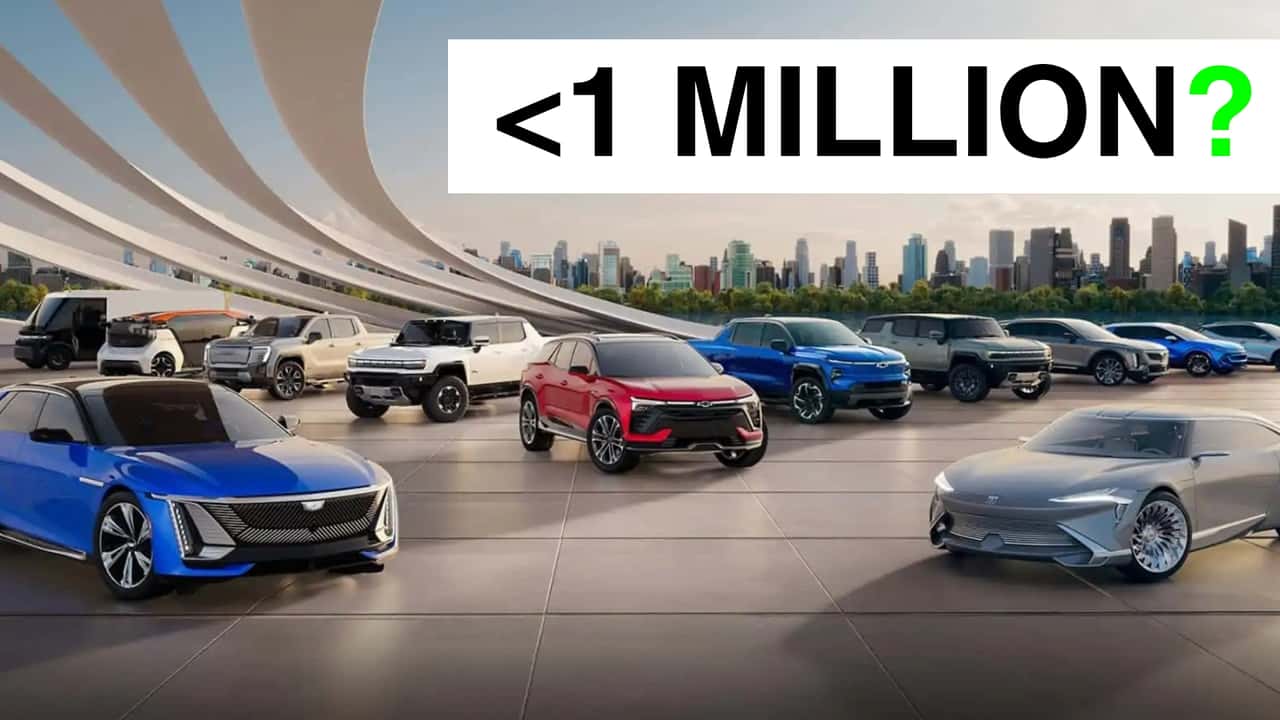General Motors shocked the world in 2021 when CEO Mary Barra announced that it would go zero-emissions by 2035. One of the first milestones on that road was coming up soon: GM planned to have the production capacity to build one million EVs per year in North America by the end of 2025. But, today, during an interview with CNBC, Barra announced that GM will not hit its goal.
“We’re seeing a little bit of a slowdown here, we won’t get to a million, because the market just isn’t developing. But we will get there,” Barra said on CNBC.
Get Fully Charged
General Motors Plans to Go all Electric By 2035
Back in 2021, General Motors CEO Mary Barra announced that General Motors would make all of its light-duty vehicles fully electric by 2035.
Although General Motors is having some of its best months ever for EV sales, it’s no secret that the brand has struggled with its electric vehicle transition. The launches of most of its Ultium-based vehicles have been plagued with software, manufacturing and initial quality problems. Whether it’s infotainment screens that won’t work on the Blazer or Lyriq, or GMC Hummer trucks that brick themselves at DC fast chargers, it’s not been a smooth rollout for GM’s electric future. There have also been production issues. GM has faced setbacks at manufacturing plants for both EV parts and the vehicles themselves.
Notably, a lot of GM’s woes have to do with the software on its EVs. Software is something that Barra admits is a really important part of General Motors’s electrified future. Getting it right is key, and so far has proved difficult.
“General Motors, moving to an all-electric future, almost what’s more important, is that the vehicle really is a software platform,” she said. But GM’s track record with software isn’t great, and all of its brands have suffered from some not-so-great press and customer feedback.
Still, Barra remains optimistic. Despite her “we will be guided by the customer,” statement— which could be interpreted as the company pulling back on EVs—she assured viewers that General Motors will get to its production goals eventually. As charging infrastructure improves and as more buyers gain firsthand experience with EVs, Barra insists that the market will continue to grow.
“The next ten, eleven, twelve years is going to be pretty transformative in the way people move,” said Barra.
Perhaps Barra is right. Although General Motors has had bad press, it does seem like it is genuinely trying to right the ship. Updates and price cuts to the Blazer EV have made for an increase in sales. The all-new Equinox EV has had strong initial reviews, and a relatively low price point should get more buyers to consider EVs. Even InsideEVs own Tim Levin thought the hubbub over the company ditching Apple CarPlay was overblown, and said GM’s homegrown Google-based solution was just fine.
Barra didn’t comment on when GM planned to hit its one million EV production capacity goal. So we’ll just have to hope they get there eventually.
Contact the author: kevin.williams@insideevs.com
General Motors (GM) has announced that it will not be able to meet its target of producing 1 million electric vehicles (EVs) by 2025. The company cited the slow development of the EV market as the main reason for falling short of their initial goal.
In a recent statement, GM CEO Mary Barra acknowledged that the company’s ambitious target was no longer feasible due to the lack of demand for EVs in the market. Despite GM’s significant investments in electric vehicle technology and production capabilities, consumers have been slow to adopt EVs as their primary mode of transportation.
Barra pointed to several factors contributing to the slow pace of EV adoption, including high costs, limited range, and lack of charging infrastructure. In addition, many consumers still have concerns about the availability of EVs in their area and the reliability of EV technology.
Although GM has made progress in developing and manufacturing electric vehicles, the company has faced challenges in convincing consumers to make the switch from traditional gasoline-powered vehicles. Barra emphasized the need for continued investment in EV technology and infrastructure to accelerate the transition to a more sustainable transportation system.
Despite the setback in meeting its 1 million EV target, GM remains committed to expanding its electric vehicle lineup and promoting a greater shift towards cleaner transportation options. The company has pledged to continue working towards achieving its long-term goal of electrifying its entire vehicle fleet and reducing its carbon footprint.
In conclusion, while GM may not hit its initial target of producing 1 million electric vehicles by 2025, the company’s determination to drive innovation and sustainability in the automotive industry remains unwavering. As the market for electric vehicles continues to evolve, GM will continue to adapt its strategies to meet the changing demands of consumers and contribute to a greener, more sustainable future.

